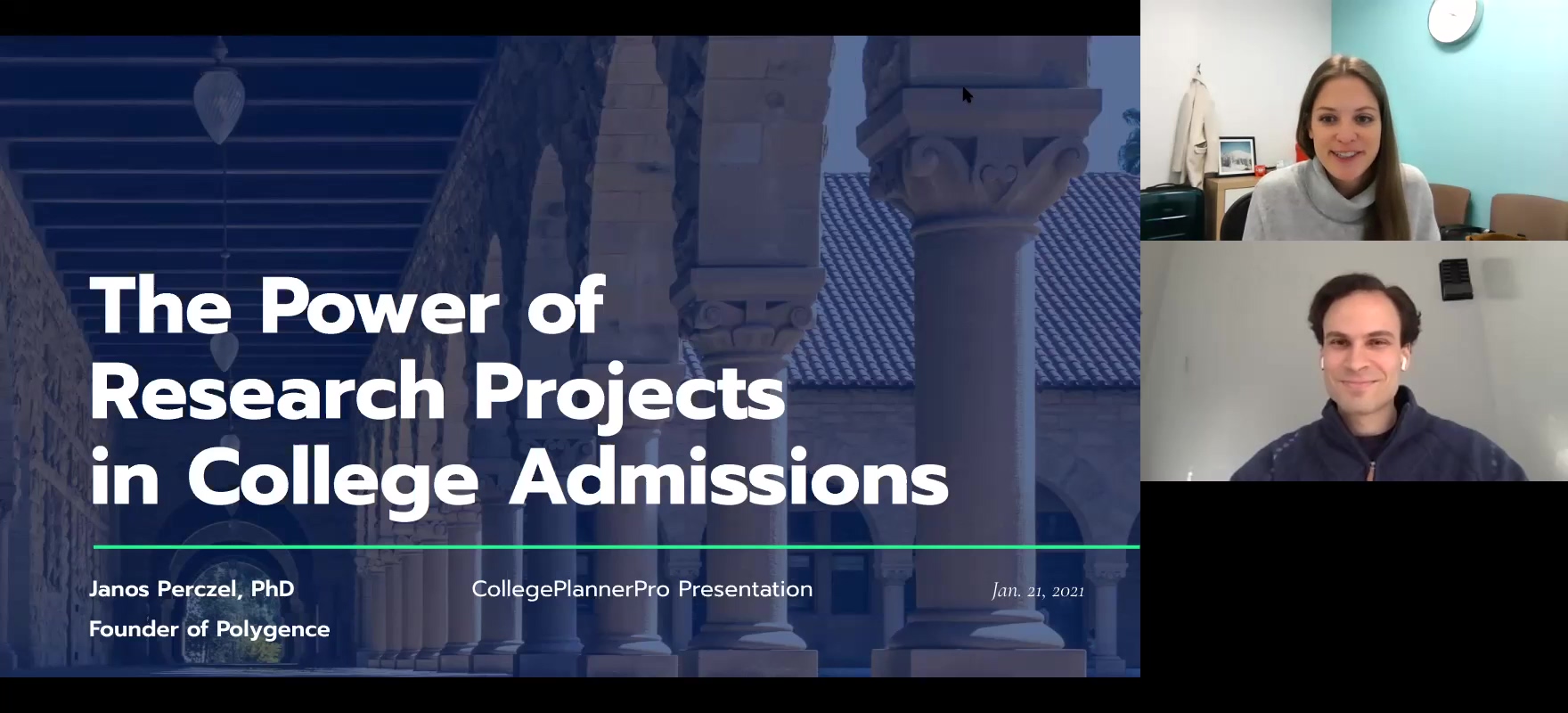
Janos Perczel, former Harvard research fellow and co-founder of Polygence, discusses how research projects and working with mentors can help students stand out to universities, and the role IECs can play in this effort.
How research shaped my academic path
I was fortunate to have a physics teacher in high school, who took an early interest in mentoring and nurturing me as a researcher. We dove deep into the strange world of relativity and quantum mechanics and read original texts from Einstein and Heisenberg about space-time manifolds and Schrödinger’s cat. Under my mentor’s guidance, I wrote early research papers that allowed me to explore these topics in depth and hone my abilities as a researcher. These early experiences set me up for success as a researcher in college and led me to pursue research in quantum physics during my doctorate at MIT and while a research fellow at Harvard.
Research is a critical product of higher education

The DNA, the radar, game theory and the Google search algorithm were all discovered at top research institutions, such asCambridge, MIT, Princeton and Stanford. Research at these top universities (so-called R1s) is a collaborative effort between professors, graduate students and undergraduates. This is why these schools look for students who are capable of doing high-quality independent academic work when evaluating prospective applicants. It is important to note that even at predominantly undergraduate institutions (PUIs) students engage in serious research, because such an open-ended activity cultivates creativity, persistence, and team spirit in students.
Research helps students stand out
According to the U.S. News and World Report, “High school students who have an impressive personal project they are working on independently often impress colleges, because their commitment to a successful solo endeavor conveys initiative, self-discipline and originality”.
The reason for this is simple. High school grades are often terrible predictors of future success (Sir John Gurdon, Nobel Prize winner in Medicine ranked last out of 250 in his year group at biology). Similarly, test scores, AP exams and summer camps with a set curriculum give students little opportunity to showcase their academic creativity and intellectual rigor. This makes it difficult for colleges to identify the most promising students, especially if they have a non-traditional background.
In contrast, a research project is by definition a unique and highly personal achievement that allows students to showcase their intellectual abilities at their best. This is why colleges encourage students to distinguish themselves through independent projects. For instance, MIT even has a creative portfolio section for all students to upload a significant research project as part of their application. Independent projects are gaining even more importance as college admissions are shifting away from standardized test scores (e.g. the University of California recently decided to phase out SAT/ACT scores completely).
How to find a research mentor

Few high school students ever get the chance to connect with a mentor at a deep level and get the attention and guidance needed to pursue an impactful research project. One potential remedy is to encourage students to reach out to researchers through their personal networks or via cold emails. However, often even the most experienced educational consultants are unsure how to help their students do this. While best practices vary depending on the field, general advice can be summarized as follows:
- Identify someone with the right expertise
Surprisingly often students reach out to a researcher whose research area is only tangentially related to what the student wants to pursue. The more relevant the student’s proposed project to the researcher’s field, the less effort it will be to provide mentorship, making a positive response more likely. - Show demonstrated interest
Many students claim interest in advanced fields like AI, astrophysics or WWII history, but few students make the effort to explore these fields in depth despite the wealth of available resources online, such as edX, Khan Academy and even Wikipedia. Researchers do not have the bandwidth or interest to teach students the absolute basics and will likely only engage with students, who would genuinely benefit from guidance with advanced topics. - Articulate what help is needed
Researchers often have very busy schedules and fear taking on additional responsibilities that involve a lot of handholding. If a student clearly states what kind of help she wants to receive (e.g. identifying relevant papers to read, understanding a particularly challenging concept or getting feedback on a journal submission draft) the researcher can better estimate how much time commitment the mentorship will involve.
It is important to note that students can do a research project even without a mentor. It just takes resilience and focus to push through the inevitable tough patches without getting discouraged. Educational consultants can play a key role in ensuring that students stay motivated throughout the process. By definition a research question has not been answered before and a student cannot be sure whether they will succeed in finding the result they are looking for. Research is also a relatively slow process (the relevant time scale is months), which is often daunting to students who are used to quick feedback loops, such as getting an A in a test they sat last week.
How to showcase a project
Students working on a project by themselves also need additional support and encouragement to find the right avenue to showcase their work. Educational consultants can assist students by making them aware of high school journals (e.g. the Journal of Youths in Science or the Concord Review), science competitions (like the Regeneron ISEF Competition) and other creative outlets (like Spotify) for showcasing their work. Each journal, competition and publishing platform has its own formatting requirements for submissions and it is important that educational consultants instruct students to follow the submission guidelines closely to ensure successful publication.
A research academy for high schoolers: Polygence
Some students may find it helpful to find a research mentor through the online research academy, Polygence, which I co-founded with Jin Chow, a comparative literature scholar from Stanford University. Students at Polygence work with an academic mentor one-on-one for 3-6 months to develop an in-depth research project. Mentors guide them from idea to execution and presentation. Polygence students have done projects ranging from using AI to detect gender bias in the media and modelling the spread of infectious diseases, to studying privacy law violations by tech companies and exploring 20th century fashion history. Upon project completion, students publish papers in high school journals, create podcasts and present at leading scholarly conferences.
In Conclusion
Regardless of whether a student finds a research mentor through a cold email, personal connections, Polygence, or with the support of their education consultant, the key to success is for students to find joy in what they are doing and to keep going despite inevitable challenges. Thus educational consultants can set up their students for success by encouraging them to pursue a topic that they find genuinely interesting and by keeping them going through constant encouragement and feedback.
Janos recently joined the CollegePlannerPro team for a live webinar to discuss this topic at length.
Watch the full recorded webinar below:


